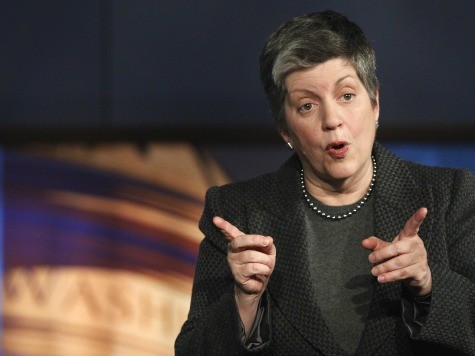
During her testimony on the “Gang of Eight” immigration bill before the Senate Judiciary Committee on Tuesday, Department of Homeland Security Secretary Janet Napolitano declared that she, President Barack Obama and other political officials at the top of this administration have the authority to decide which laws to enforce, and which ones to ignore.
Napolitano made the declaration in an exchange with Sen. Jeff Sessions (R-AL) when he was questioning her on how Immigration and Customs Enforcement (ICE) agents have alleged that political officials in the Obama administration, including her, have blocked them from enforcing the law.
Sessions noted that ICE agents’ union president Chris Crane had testified on Monday “that agents are prohibited from enforcing the law and, indeed, the ICE officers have filed a lawsuit [to that effect].”
“I started out as a federal prosecutor in the Department of Justice in 1975,” Sessions said. “I have never heard of a situation in which a group of law officers sued their supervisor and you for blocking them from following the law. They weren’t complaining about pay, benefits, working conditions. They were saying their very oath they took, to enforce the law, is being blocked by rules and regulations and policies established from on high and that this is undermining their ability to do what they’re sworn to do.”
In her response to those remarks from Sessions, Napolitano said she believes she and other political officials have the authority to tell law enforcement agents which laws to enforce and which ones to ignore.
“There are tensions with union leadership, unfortunately, but here’s what I expect as a former federal prosecutor and attorney general, and that is that law enforcement agents will enforce the law in accord with the guidance they’re given from their superiors,” Napolitano said. “That’s what we ask of ICE, that’s what we ask of Border Patrol, that’s what we ask throughout the Department and I believe that would be consistent with all law enforcement. Agents don’t set the enforcement priorities. Those are set by their superiors and they are asked then to obey that guidance in accord with the law.”
Sessions was not pleased with Napolitano’s response, so he followed up by asking: “”Well, what Mr. Crane testified to was that there are law provisions that say an agent shall do this, that and the other, and that the policies set by their political supervisors refuse to allow them to do what the law plainly requires. You are not entitled to set policies, are you, that violate the mandates of congressional law?”
Napolitano answered that question by saying she “disagree[s] with almost everything” Sessions has said, “but we’ll just have to respectfully disagree with each other.”
“But, I think it does point to why this bill needs to be passed, because what we want our officers doing is focusing on narco-traffickers and human smugglers and money launderers and others who misuse our border and our immigration system,” Napolitano said. “By having a process by which those in the country illegally can pay a fine, pay fees, register so we know who they are, by dealing with the employer demand for illegal labor, by opening up the visa system, that will have the effect, basically, of confirming the focus of resources where they need to be.”
Despite Napolitano’s and the administration’s belief that they can tell law enforcement agents which laws to enforce and which ones to ignore, the “Gang of Eight” immigration bill cedes even more authority away from Congress and gives it to the administration.
In their lines of questioning with Napolitano during Tuesday’s hearing, Sens. Ted Cruz (R-TX) and Mike Lee (R-UT) focused on how the bill cedes authority. In a statement he issued after the hearing indicating he is not satisfied with the bill’s so-called “border security triggers” that are supposedly meant to ensure the border actually gets secured, Cruz said he does not trust the bill will actually secure the border.
“As it stands, the border security component – which numbers only 58 pages of the 844-page bill – largely cedes authority to the Department of Homeland Security to determine when and how the border would be secure,” Cruz said. “However, today’s hearing revealed that the last clear metric for border security – ‘operational control’ – reflected that in 2010, DHS had secured 873 miles of the more than 2,000 mile border. When that metric did not demonstrate success, DHS decided to simply abandon the metric. In order for a metric to be real, it must be meaningful. Currently, there are no objective metrics in place to ensure any triggers in this bill will be meaningful, all while the pathway to citizenship component remains contingent on this undefined border security.”
Lee similarly questioned why the Gang of Eight bill gives Napolitano and the administration so much authority. “Some of the questions that I have as I’ve read through this bill over the last few days relate to the amount of discretion you are given, you and your successors will be given over time, should this become law,” Lee opened his line of questioning with Napolitano on Tuesday.
Even Gang of Eight member Sen. Marco Rubio (R-FL) admits the amount of authority the bill would cede to the administration is controversial. “Biggest challenge on #immigrationreform has been well founded lack of trust that Obama administration will enforce the law,” Rubio Tweeted on Tuesday. “Its [sic] a big problem”

COMMENTS
Please let us know if you're having issues with commenting.